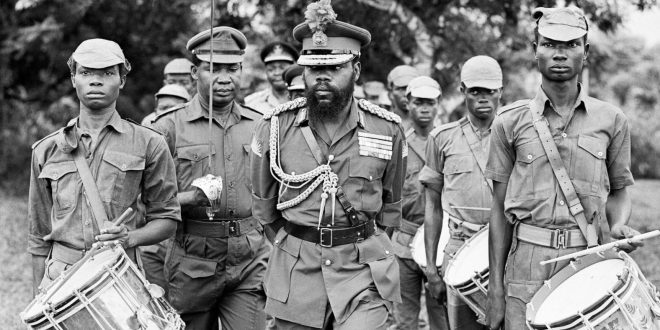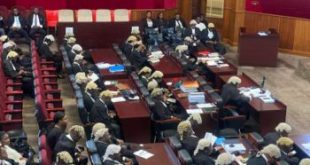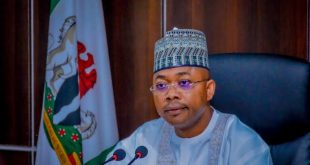The Nigerian Civil War, commonly known as the Biafran War, lasted from 1967 to 1970 and left an indelible mark on the nation’s history, resulting in the deaths of over a million people. The war emerged as a response to the perceived marginalization of the Igbo people, who felt excluded from political power and representation in the wake of Nigeria’s independence. Nearly sixty years after the conflict’s conclusion, the war’s legacy continues to resonate throughout Nigerian society and politics, shaping identities, influencing governance, and fueling ongoing discussions about justice and reconciliation.
In this exploration, we delve into the intricate web of events that led to the secession of Biafra and the subsequent civil war, seeking to understand the historical, social, and political contexts that paved the way for such a tragic outcome. Gavin Williams argues that the narratives surrounding the Biafran War have often been silenced or selectively constructed, leaving many stories untold and much of the truth obscured. The events leading to the war remain some of the most critical and heartbreaking in Nigeria’s history, yet they are frequently overlooked or misrepresented.
The Prelude to Conflict
The origins of the Nigerian Civil War can be traced back to a series of historical events that unfolded long before the first shots were fired. The amalgamation of the Northern and Southern Protectorates in 1914, an act aimed at unifying diverse ethnic groups under a single colonial administration, sowed the seeds of discord. With the arbitrary borders drawn by colonial powers, long-standing tribal tensions were exacerbated, creating a volatile political landscape.
In the post-colonial era, as Nigeria gained independence in 1960, these tensions only intensified. The electoral conflicts of the 1950s highlighted the struggle for political power among Nigeria’s ethnic groups. The Action Group crisis of 1962, coupled with the controversial census counts of 1962 and 1963, further polarized the nation. These events laid bare the underlying fractures within Nigerian society, as various groups jockeyed for political dominance.
By the mid-1960s, the situation had reached a breaking point. The political arena was rife with accusations of rigged elections, ethnic favoritism, and violence. The coup d’état of January 1966 marked a significant turning point, as a group of young military officers, primarily from the Eastern region, sought to eradicate corruption and establish a more equitable political structure. However, this move was met with a violent backlash from Northern politicians and military leaders, culminating in retaliatory killings of Igbo civilians and military personnel.
In the aftermath of these events, the Eastern region, feeling increasingly threatened and marginalized, began to push for secession. The declaration of Biafra on May 30, 1967, was both a desperate cry for self-determination and a reaction to the systemic injustices faced by the Igbo people.
The War Unfolds
The Biafran War officially began on July 6, 1967, when the Federal Government launched a military offensive to reclaim the secessionist territory. What ensued was a brutal conflict characterized by immense suffering, starvation, and human rights violations. The Biafran leadership, under Colonel Odumegwu Ojukwu, initially managed to repel Nigerian forces and maintain control over significant portions of the territory.
However, the reality of war soon set in. As the conflict dragged on, the humanitarian crisis deepened, with widespread famine affecting millions of civilians. The world watched in horror as images of emaciated children and suffering families flooded the media. International humanitarian organizations, including the International Committee of the Red Cross, struggled to provide relief amid the chaos, often facing obstacles imposed by the Nigerian government.
The war was not only a military struggle but also a battle for narratives. Biafra was envisioned as an antidote to the tribalism and corruption that plagued Nigeria. It became a symbol of hope for many, a vision of a new nation free from the injustices experienced under the federal system. Yet, as the war progressed and the realities of military defeat loomed, the dream of an independent Biafra began to fade.
By late 1969, it was evident that the war was unwinnable for the Biafran side. The federal troops had made significant advances, capturing key cities and cutting off supply routes. Despite the odds, Ojukwu continued to rally support, blaming setbacks on saboteurs and external interference. The ability to sustain the fight despite clear signs of impending defeat was both a testament to the resilience of the Biafran people and a tragic reflection of their plight.
Legacy of the War
The Nigerian Civil War officially ended on January 15, 1970, but its legacy continues to shape the country in profound ways. The conflict resulted in a staggering loss of life, with estimates suggesting that between one to three million people perished, primarily due to starvation and disease. The scars of war remain etched in the collective memory of the nation, influencing political discourse and social dynamics to this day.
The post-war period was marked by a complex process of reconciliation and reconstruction. General Yakubu Gowon, the military ruler at the time, promoted the slogan “No Victor, No Vanquished,” aiming to foster national unity and healing. However, the reality was more complicated. Many Biafrans returned to a society still rife with prejudice and suspicion. The lack of accountability for war crimes and the failure to address the grievances that fueled the conflict left deep-seated resentments simmering beneath the surface.
Gavin Williams argues that the narratives surrounding the war have often been manipulated for political purposes, leading to a selective remembrance that ignores the broader implications of the conflict. The historical accounts of the war, while documented, have been overshadowed by contemporary political narratives that seek to reframe the conflict to serve current interests. This selective remembrance has implications for how future generations understand their history and identity.
Politics and Power Dynamics
The aftermath of the Biafran War altered the political landscape of Nigeria. The centralization of power in the hands of the federal government became more pronounced, with military rulers consolidating their authority. The oil boom of the 1970s provided the government with substantial revenue, further entrenching the existing power structures.
Yet, the legacy of the war also laid the groundwork for future conflicts. Ethnic tensions, exacerbated by political exclusion and economic disparities, persisted in the years following the conflict. The struggle for resource control and political representation continued to fuel unrest, leading to various regional and ethnic uprisings.
In contemporary Nigeria, issues of governance, corruption, and ethnic marginalization remain at the forefront of political discourse. The political class, often perceived as self-serving and disconnected from the needs of ordinary citizens, has struggled to build a cohesive national identity that transcends ethnic lines. This has led to a cycle of violence, with various groups resorting to armed conflict in pursuit of their rights and recognition.
Reflections on Memory and Identity
The legacy of the Nigerian Civil War is not merely a historical footnote; it is a living reality that shapes the identities of millions. For the Igbo people, the memories of the war are intertwined with their sense of self and community. The war’s narrative is a source of pride and pain, a reminder of both their resilience and the injustices they faced.
As Nigeria continues to grapple with its past, the importance of memory becomes increasingly evident. The struggle to come to terms with the civil war reflects a broader challenge of reconciling diverse narratives and histories within the nation. The call for justice and accountability remains a vital aspect of this journey, as many continue to seek recognition for the suffering endured during the conflict.
Art, literature, and cultural expressions have emerged as powerful tools for confronting the past and fostering dialogue. Writers, poets, and filmmakers have sought to capture the complexities of the war experience, providing platforms for voices that have long been silenced. These artistic expressions serve not only as a means of remembrance but also as a catalyst for healing and understanding.
Moving Forward
As Nigeria looks to the future, the lessons of the Biafran War offer valuable insights. The need for inclusive governance, equitable resource distribution, and genuine reconciliation remains critical. Addressing the grievances of marginalized communities and fostering a sense of belonging for all citizens is essential for preventing the recurrence of past conflicts.
Moreover, fostering a culture of dialogue and understanding among Nigeria’s diverse ethnic groups is paramount. Engaging in honest conversations about the past and acknowledging the pain and suffering endured by various communities can pave the way for healing and reconciliation.
In this ongoing journey, the responsibility lies not only with political leaders but also with academics, writers, and artists. By breaking the silences surrounding the civil war and amplifying marginalized voices, they can contribute to a more comprehensive understanding of Nigeria’s history and identity.
Conclusion
The Nigerian Civil War remains a pivotal moment in the country’s history, echoing through the lives of its people and the fabric of its society. As we revisit the events of the past, we must grapple with the complexities of memory, identity, and power. The lessons learned from this tragic chapter should guide Nigeria as it navigates its path forward, striving for unity, justice, and a shared future.
The journey towards reconciliation is fraught with challenges, but it is a necessary endeavor for building a Nigeria that honors its past while looking boldly toward the future. Through understanding and dialogue, the wounds of the Biafran War can begin to heal, allowing for a more inclusive and harmonious society. As Nigeria continues to confront its history, the stories of those who lived through the civil war must not be forgotten; instead, they should inspire a collective commitment to a better, more equitable nation.
 National Telescope national telescope newspaper
National Telescope national telescope newspaper



